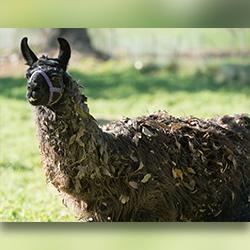All About Midge the Llama
Slideshow
This slideshow contains 3 slides that will change every 8 seconds. The first button is to play and pause the slideshow, followed by buttons to go to the previous slide, next slide, or choose individual slides.

She’s got snaggly teeth, bulgy eyes, and fur that is sometimes matted with leaves and smells like a barnyard, but that doesn’t stop Midge the llama from being one of the most popular figures on campus.
Whenever she appears on the university’s Facebook page, she gets showered with likes, shares, and adoring comments.
The Department of Animal & Veterinary Services bought Midge in Fall 2014 from a private owner in Norco. She replaced another llama, Charles, who retired that year, to watch over the department’s sheep.
“Llamas are very alert,” says Brad Foyil, the livestock technician who manages the sheep unit. “They are always on watch and can put themselves between the sheep and predator and chase or kick it away.”
Coyotes are the main predators in and around the Cal Poly Pomona campus. On rare occasions, they can be seen on the old Spadra landfill by AGRIscapes. They can sometimes be heard howling in response to the sirens of emergency vehicles rushing by on Temple Avenue. Just recently, one coyote was photographed on South University Drive near the beef unit and the Collins College of Hospitality Management.
The department often moves the sheep around campus, from the vineyards, to Spadra Farm, and then back to the sheep unit’s pasture. The schedule depends on where the sheep are needed to graze and clear a field and where grass or forage are available.
Midge goes wherever the flock goes. So far, the department hasn’t lost any sheep to a predator.
When she’s not grazing with the sheep, Midge eats alfalfa hay and special llama pellets to stay healthy. And she gets sheared every other year. At 17, Midge is already middle aged for her species, which can live up to 30 years.
The department has no plans at this point to add any more llamas.
“Llamas work better as a guardian for our sheep when they work alone,” Foyil says.
For any student thinking about sneaking up to pet Midge, Foyil has some advice: don’t. Llamas are known to spit.
“It’s best to keep your distance,” he says, “as it’s her job to guard the flock.”
